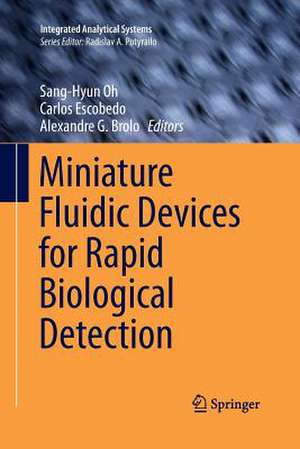Miniature Fluidic Devices for Rapid Biological Detection: Integrated Analytical Systems
Editat de Sang-Hyun Oh, Carlos Escobedo, Alexandre G. Broloen Limba Engleză Paperback – 6 iun 2019
A key challenge in the field of bioanalytical sensors is the rapid delivery of target biomolecules to the sensing surface. While various nanostructures have shown great promise in sensitive detection, diffusion-limited binding of analyte molecules remains a fundamental problem. Recently, many researchers have put forward novel schemes to overcome this challenge, such as nanopore channels, electrokinetics, and dielectrophoresis, to name but a few. This book provides the readers an up-to-date account on these technological advances.
| Toate formatele și edițiile | Preț | Express |
|---|---|---|
| Paperback (1) | 718.61 lei 6-8 săpt. | |
| Springer International Publishing – 6 iun 2019 | 718.61 lei 6-8 săpt. | |
| Hardback (1) | 725.71 lei 6-8 săpt. | |
| Springer International Publishing – 30 ian 2018 | 725.71 lei 6-8 săpt. |
Din seria Integrated Analytical Systems
- 19%
 Preț: 588.65 lei
Preț: 588.65 lei - 18%
 Preț: 1229.40 lei
Preț: 1229.40 lei - 18%
 Preț: 954.45 lei
Preț: 954.45 lei - 15%
 Preț: 641.71 lei
Preț: 641.71 lei - 15%
 Preț: 638.43 lei
Preț: 638.43 lei - 15%
 Preț: 658.05 lei
Preț: 658.05 lei - 15%
 Preț: 651.99 lei
Preț: 651.99 lei - 18%
 Preț: 959.19 lei
Preț: 959.19 lei - 18%
 Preț: 966.15 lei
Preț: 966.15 lei - 18%
 Preț: 1007.65 lei
Preț: 1007.65 lei - 15%
 Preț: 698.80 lei
Preț: 698.80 lei - 18%
 Preț: 1393.09 lei
Preț: 1393.09 lei - 18%
 Preț: 725.71 lei
Preț: 725.71 lei - 15%
 Preț: 639.25 lei
Preț: 639.25 lei - 18%
 Preț: 1226.11 lei
Preț: 1226.11 lei
Preț: 718.61 lei
Preț vechi: 876.35 lei
-18% Nou
Puncte Express: 1078
Preț estimativ în valută:
137.52€ • 142.07$ • 114.45£
137.52€ • 142.07$ • 114.45£
Carte tipărită la comandă
Livrare economică 25 martie-08 aprilie
Preluare comenzi: 021 569.72.76
Specificații
ISBN-13: 9783319878607
ISBN-10: 3319878603
Pagini: 229
Ilustrații: VII, 229 p. 117 illus.
Dimensiuni: 155 x 235 mm
Greutate: 0.34 kg
Ediția:Softcover reprint of the original 1st ed. 2018
Editura: Springer International Publishing
Colecția Springer
Seria Integrated Analytical Systems
Locul publicării:Cham, Switzerland
ISBN-10: 3319878603
Pagini: 229
Ilustrații: VII, 229 p. 117 illus.
Dimensiuni: 155 x 235 mm
Greutate: 0.34 kg
Ediția:Softcover reprint of the original 1st ed. 2018
Editura: Springer International Publishing
Colecția Springer
Seria Integrated Analytical Systems
Locul publicării:Cham, Switzerland
Cuprins
Optical trapping of biomolecules.- Microfluidic detection for energy applications.- Nanoplasmonic biosensors.- Nanopores for molecules sensing.- Optofluidics.- SERS using papers.- Dielectrophoresis-enhanced nanoplasmonic sensors.- Molecular transport in nanoscale sensors.- Single cell analysis.- Multiplex microfluidic devices.- Optofluidics.- Neurochemical biosensing.- Lens-free on-chip biosensing.- Single-cell analysis.- Digital microfluidics.
Notă biografică
Sang-Hyun Oh is a Sanford P. Bordeau Professor in the Department of Electrical and Computer Engineering at the University of Minnesota, Twin Cities. He received his PhD in Applied Physics from Stanford University. His research interests include nanotechnology, biosensors, nano-optics, and nanofabrication.
Carlos Escobedo is an Assistant Professor in the Department of Chemical Engineering at Queen's University. He received his PhD in Mechanical Engineering from the University of Victoria. His research interests include the development of (bio)sensing technology, and microfluidic platforms to advance knowledge in medicine and biology.
Alexandre G. Brolo is a Professor of Chemistry at the University of Victoria, Canada. He received his PhD in Physical Chemistry from the University of Waterloo, Canada. His current research interest includes surface spectroscopy, biosensors and metallic nanostructures.
Carlos Escobedo is an Assistant Professor in the Department of Chemical Engineering at Queen's University. He received his PhD in Mechanical Engineering from the University of Victoria. His research interests include the development of (bio)sensing technology, and microfluidic platforms to advance knowledge in medicine and biology.
Alexandre G. Brolo is a Professor of Chemistry at the University of Victoria, Canada. He received his PhD in Physical Chemistry from the University of Waterloo, Canada. His current research interest includes surface spectroscopy, biosensors and metallic nanostructures.
Textul de pe ultima copertă
This book presents an overview of fundamental aspects of surface-based biosensors and techniques for enhancing their detection sensitivity and speed. It focuses on rapid detection using miniaturized sensors and describes the physical principles of nanoscale transducers, surface modifications, microfluidics and reaction engineering, diffusion and kinetics.
A key challenge in the field of bioanalytical sensors is the rapid delivery of target biomolecules to the sensing surface. While various nanostructures have shown great promise in sensitive detection, diffusion-limited binding of analyte molecules remains a fundamental problem. Recently, many researchers h
ave put forward novel schemes to overcome this challenge, such as nanopore channels, electrokinetics, and dielectrophoresis, to name but a few. This book provides the readers an up-to-date account on these technological advances.
A key challenge in the field of bioanalytical sensors is the rapid delivery of target biomolecules to the sensing surface. While various nanostructures have shown great promise in sensitive detection, diffusion-limited binding of analyte molecules remains a fundamental problem. Recently, many researchers h
ave put forward novel schemes to overcome this challenge, such as nanopore channels, electrokinetics, and dielectrophoresis, to name but a few. This book provides the readers an up-to-date account on these technological advances.
Caracteristici
Focuses on rapid detection using miniaturized sensors Describes the physical principles of nanoscale sensors, surface modifications, microfluids and reaction engineering, diffusion and kinetics Covers fundamental aspects of surface-based biosensors and techniques for enhancing their detection sensitivity and speed
